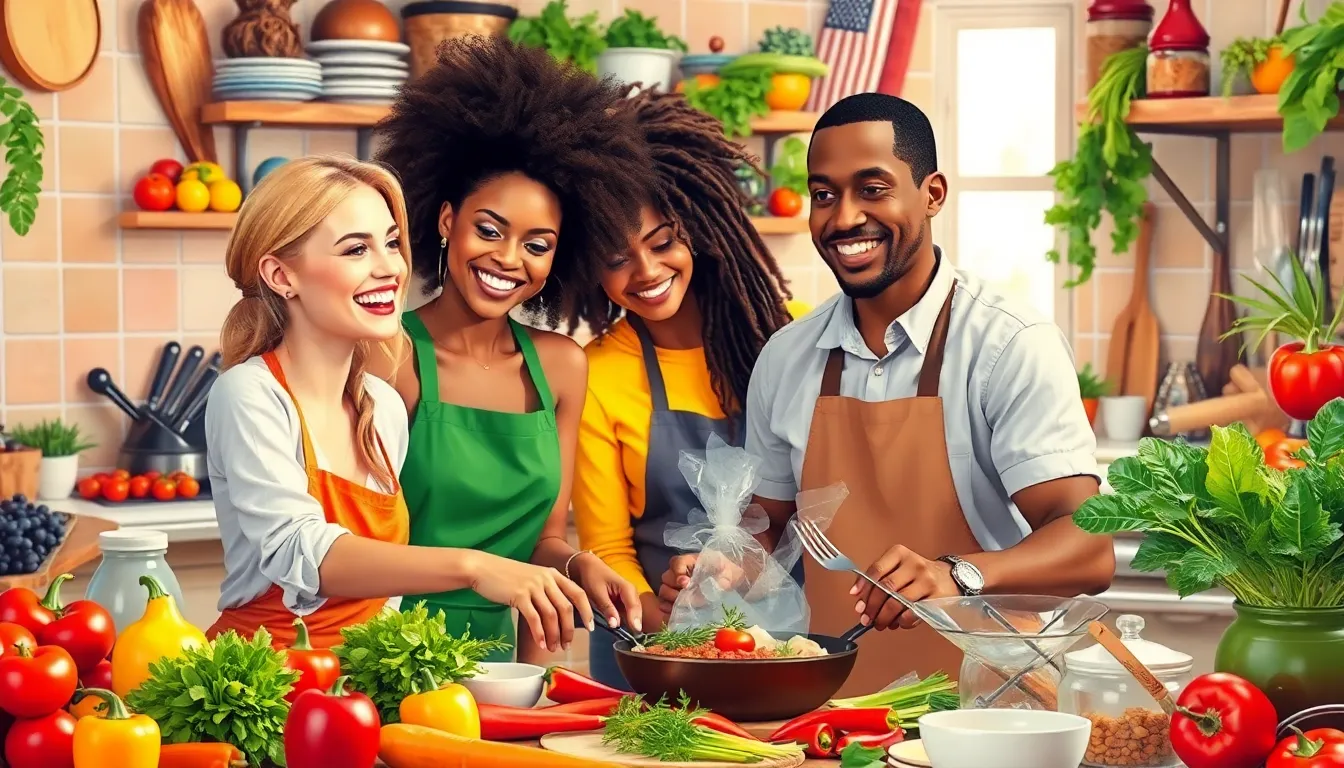Cooking isn’t just about whipping up a meal; it’s an adventure waiting to unfold in your kitchen. Whether you’re a culinary novice or a seasoned chef, the joy of cooking activities can turn a mundane evening into a delightful experience. Imagine the aroma of freshly baked cookies wafting through the air or the satisfying sizzle of veggies hitting a hot pan. Who knew that mixing flour and water could lead to such happiness?
Table of Contents
ToggleWhat Are Cooking Activities?
Cooking activities encompass a range of engaging tasks focused on preparing food. They include tasks like chopping vegetables, measuring ingredients, and mixing batter. Exploring these activities enhances skills while providing sensory enjoyment.
Hands-on experiences benefit individuals of all ages. They can involve children learning basic skills or experienced chefs experimenting with new recipes. Group cooking activities foster collaboration, allowing people to share techniques and ideas while creating meals together.
Popular cooking activities range from baking to grilling. Participants enjoy the process of making homemade pizzas or experimenting with international cuisines. Each activity provides opportunities for creativity, enabling individuals to customize dishes according to personal tastes.
Moreover, cooking activities often emphasize nutrition. Participants learn about healthy ingredients while making meals that support their well-being. Cooking classes offer structured environments where individuals can improve culinary skills while understanding nutrition’s importance.
In addition to skill development, cooking activities promote mindfulness. Engaging with ingredients makes individuals more aware of their food choices. This awareness enhances appreciation for flavors and the effort involved in meal preparation.
Cooking activities also contribute to social bonding. Friends and family can gather in the kitchen to share stories while preparing a meal. These interactions strengthen relationships while creating lasting memories centered around food.
Benefits Of Cooking Activities

Cooking activities provide numerous advantages that enhance both physical and mental well-being. Engaging in these tasks promotes skill development and fosters a deeper appreciation for food.
Enhancing Creativity
Creativity flourishes in the kitchen. Experimenting with flavors and presentation allows individuals to express their unique culinary styles. Variations of traditional recipes inspire innovation. Cooking together encourages collaboration, leading to the creation of new dishes. Participants share ideas and techniques, which fuels imaginative thinking. Additionally, the kitchen serves as a canvas for artistic expression. Using vibrant ingredients can transform a simple meal into an aesthetic delight. Embracing spontaneity keeps the cooking experience fresh and exciting.
Promoting Healthy Eating Habits
Healthy eating habits become easier with cooking activities. Participants learn to recognize fresh, nutritious ingredients. Preparing meals from scratch helps individuals control portion sizes and reduce unhealthy additives. Knowledge of cooking techniques can lead to healthier choices, encouraging the use of whole foods. Engaging in meal planning elevates awareness of dietary needs. Cooking together allows family members to discuss and prioritize healthful options. As a result, cooking fosters a positive relationship with food and encourages mindful consumption.
Types Of Cooking Activities
Cooking activities encompass various engaging experiences that cater to different preferences and settings. Individuals can explore personal projects or engage collaboratively with others.
Individual Cooking Projects
Individual cooking projects foster independence and skill development. Participants can experiment with recipes while honing their culinary techniques. Creating dishes, such as homemade pasta or artisan bread, allows exploration of new flavors and textures. Solo cooking offers the freedom to customize meals according to personal tastes. These projects often enhance an individual’s understanding of ingredients, cultivating creativity in the kitchen.
Group Cooking Experiences
Group cooking experiences encourage social interaction and teamwork. Friends or family members can gather to prepare communal meals, strengthening bonds through shared tasks. Activities like potluck dinners or cooking classes promote collaboration, enabling participants to learn from each other. These experiences often spark creativity, inspiring unique dish variations. Sharing responsibilities in the kitchen allows everyone to contribute, turning meal preparation into a fun and enjoyable event.
Tips For Successful Cooking Activities
Successful cooking activities rely on effective planning and preparation. Gather all necessary ingredients and tools before starting. Organizing the workspace boosts efficiency and reduces stress during cooking. Create a checklist for ingredients and a detailed recipe outline to follow. Testing recipes in advance helps refine techniques and ensures the final dish meets expectations.
Planning And Preparation
Effective planning enhances the cooking experience. Selecting recipes that fit dietary preferences and skill levels simplifies the process. Allocating adequate time for each cooking task prevents rushing and mistakes. Moreover, prepping ingredients in advance saves time during actual cooking. Chopping vegetables and measuring spices beforehand streamlines the workflow. Involving all participants in this phase fosters teamwork and ensures everyone’s on the same page.
Safety Considerations
Prioritizing safety is crucial in any cooking activity. Maintaining cleanliness helps prevent cross-contamination. Participants should wash hands frequently and use separate utensils for raw and cooked foods. Wearing appropriate clothing, such as aprons, protects against spills. Furthermore, using knives and other tools safely prevents accidents. Instruct everyone on fire safety, including how to handle stovetops and ovens responsibly. Creating a safe cooking environment fosters a positive experience for all involved.
Cooking activities offer a unique blend of creativity and connection. They transform the kitchen into a vibrant space where individuals can express themselves and bond with others. The joy of cooking transcends mere food preparation; it fosters a deeper appreciation for ingredients and the art of meal creation.
Engaging in these activities not only enhances culinary skills but also promotes healthier eating habits. As people gather to cook, they share experiences and build lasting memories. Whether through individual projects or group events, the benefits of cooking activities extend far beyond the plate, enriching lives with each delicious creation. Embracing these experiences can lead to a more mindful and enjoyable relationship with food.




